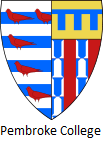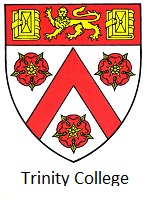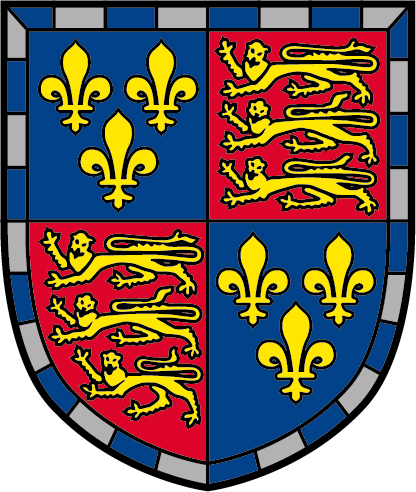Introducing the trainees of 2023-2024, describing our various backgrounds, what made us decide to pursue a career in the information sector, and what we hope to do next. Click on the name of each college for the trainee’s bio.
ARU ♦ Newnham ♦ Pembroke ♦ Queens’ ♦ St John’s ♦ Trinity ♦ Christ’s
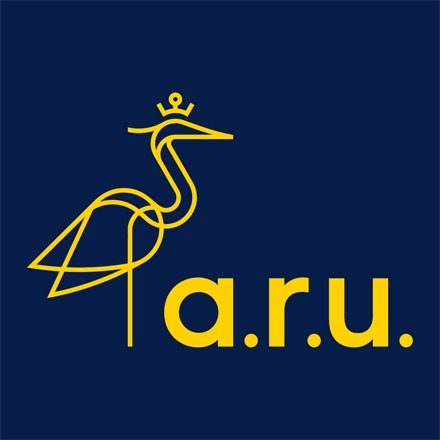
Anglia Ruskin University – Zia Ortega
Where did you study previously? Which subject?
I completed my Dip HE in Nursing (Mental Health) at De Montfort University and later topped up to a BSc in Nursing at the University of Derby. My program focused primarily on clinical leadership and evidence-based practice. For my independent study, I completed a systematic review exploring the relationship between depression, probiotics and the gut-brain axis.
Did you have any previous library experience before applying?
I did not have any working library experience before applying. However, with my previous experience working in healthcare, many of my acquired skills were transferrable to the role.
What attracted you to the ARU traineeship?
I have been considering a career in librarianship for a while. It was important for me to gain practical experience. With ARU’s traineeship, I can work hands on within an academic library team and build skills within a supportive environment. The Graduate Trainees are a valued member of the Library and Student Services team here at ARU and there are numerous opportunities for continuing professional development. As part of the traineeship, there are lots of scheduled visits to other libraries and gain insight into the diversity of library and information services in other sectors and institutions. ARU also delivers impactful research; I am very excited at the prospect of spending one month of my traineeship with the research team here at ARU later in the year.
What are your aspirations for your future career?
I’ve discovered on this traineeship that I absolutely love working in the library and information services sector. I know this is the career field for me. The field of librarianship is varied, and I will learn more about other sectors of librarianship as the year progresses. So, at this point, I’m keeping an open mind. However, I would like to combine my previous healthcare experience with librarianship, working either in a Health Library or as a Subject Librarian would be of interest to me.
What advice would you give to future applicants?
ARU Library is a fantastic place to complete your traineeship; it is filled with opportunities to get fully involved and expand knowledge and skills of the library and information sector. You do not need to have previous library experience as many skills can be transferable. The role is also very people centred; I think it is important for applicants to be aware of this as having a passion for helping people is at the heart of library services. Also, please do not let a lack of experience put you off from applying as many skills are transferable to this role.
What is your favourite book?
This is such a difficult question to answer. I’m mostly drawn to non-fiction books and autobiographies. I’m currently enjoying Thomas Merton’s The Seven Storey Mountain. One charming book which has been a recent discovery for me is Antoine de Saint-Exupery’s The Little Prince. I find myself re-reading it and buying multiple versions of it. It is such an enchanting book for both children and adults alike.
Pembroke College – Grace Hogan (she/her)
Where did you study previously? Which subject?
I did my undergraduate degree in English Literature at Durham University, focusing on ecology and feminized environments within the writings of Romantic poets.
Did you have any previous library experience before applying?
Throughout my school holidays as a teenager, I helped with Summer Reading Challenges at local libraries in my area (because I loved it, but also because my Mum is a librarian)! I have always really enjoyed volunteering in public libraries, as I feel they are incredibly valuable spaces within local communities, and I was interested to see all the services they provide to a diverse group of people. Whilst at university, I helped out in my college’s library, especially during the pandemic when it reopened to students, and I found this a really interesting experience that opened my eyes to the way libraries worked beyond local communities and within an academic setting.
What attracted you to the Pembroke traineeship?
I knew I wanted to find a way to work in libraries after my undergraduate, but I had no idea that such things as traineeships existed in Cambridge! Once I discovered them, I knew immediately that this was what I wanted to spend the next year doing. The Pembroke traineeship came at just the right time, as I had begun to explore the various Cambridge colleges that offered, and Pembroke seemed the perfect fit for me, with a varied poetic history (and the loveliest clock tower)! It also offered me a different perspective on library work, as I had spent most of my time previously in public libraries. I was keen to learn how academic libraries differ, not only in their day-to-day running but also in their rich histories and archives.
What are your aspirations for your future career?
At the moment, I’m keen to go into Librarianship in any capacity! I have a long-standing respect for the work that neighbourhood librarians do and know I would find that side of the job very rewarding. However, I have found special collections work fascinating, and love the idea of working with them in my subject speciality, such as poetry archives. Alongside this, I am keen to find ways to make libraries and archives more accessible spaces. It has been amazing to see all the resources that libraries at Cambridge have, and I am interested in exploring how these resources can become more accessible to those in disadvantaged areas and how libraries and archives can improve their outreach.
What advice would you give to future applicants?
Don’t be put off if you don’t have previous library experience! No experience is irrelevant or ‘pointless’ to talk about and although library experience can be useful in an application, working in libraries is much more about your own transferable skills, as well as your interests and specialities.
It’s also really valuable to learn as much as you can about libraries themselves, especially the various Cambridge ones! Cambridge libraries often work slightly differently from other academic institutions, so if you can research and find out about their peculiarities and nuances, it can be really useful to draw on that knowledge. Reach out to other librarians, look into events happening nearby and, most importantly, read this blog!
What is your favourite book?
As an English student and a long-time library user, this question is nearly impossible! However, when asked about it, I find the best practice is not to overcomplicate matters, so I always say my very first favourite book – J.M. Barrie’s Peter and Wendy. 🙂
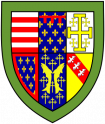
Queens’ College – Anna Piper-Thompson
Where did you study previously? Which subject?
I studied English at the University of Cambridge and was at Clare College. I specialised in medieval literature, particularly looking at book history and the material manuscript and marks left by women readers.
Did you have any previous library experience before applying?
In my teens I volunteered a little at my local library, mostly helping with reading events for young children and participating in the weekly young-people’s book club ran by the library. In my second year at University, I emailed many, many college archivists and librarians in Cambridge asking for volunteer opportunities; following this, I volunteered for two-three hours a week in the archives in Christs College, and in the summer between my second and third year I was employed at the Forbes Mellon Library in Clare College as a part-time assistant for the archives and student library where I learned about classification, and helped with practical tasks in the library like stock checking, shelving and labelling. I also think the transferrable skills I developed in other employment (as a waitress, barista, tutor and free-lance illustrator), studies, and extra-curriculars has proved helpful to me in my traineeship! Certainly, my undergraduate research into book history, readership and libraries, has proved particularly relevant.
What attracted you to the Queens’ traineeship?
Quite unusually, Queens’ offers training in rare books cataloguing, and also splits the trainee’s time 50/50 across the student library and the Old Library. This position also offers lots of opportunities to work on displays and exhibitions. I want to pursue rare book collection work, so being able to spend time working every day with rare books, and also learn important skills in this area is really invaluable, as well as being a generally wonderful way to spend my day. As a medievalist, I also love particular quirks about the library space in Queens’; the transformation of medieval lecterns to bookshelves, and the remanence of medieval wall-paintings in the renovated Chapel which is now the War Memorial Library, for example.
What are your aspirations for your future career?
In my ideal future, I would be working with medieval manuscripts as much as possible. I would love to work with rare book collections, either in librarian, curatorial or academic areas. I plan on doing further postgraduate study next year into book history and the marks left in books.
What advice would you give to future applicants?
Think about how all different facets of yourself, your interests, and your experiences could be applicable to the role, and really lean into why you are interested in the position and how you see the role aiding you reach the future you are aiming for – show your enthusiasm!
What is your favourite book?
As a lifelong bookworm and an English grad, I have stress dreams about this question (jk), and if I think too hard about it I end up spiralling into what ‘favourite’ really even *means* anyway, so I normally answer with the book that I have reread the most, which is Han Kang’s ‘The White Book’. It is a book that makes me feel very deeply, but I also love the style in which it is written (in little vignettes which are richly descriptive but also reflect the casualness of every day observance), and promotes interesting thought about the intersection of book objects and art.
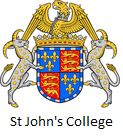
St. John’s College – Harriet Edwards
Where did you study previously? Which subject?
I did my undergrad at Robinson College, Cambridge and I studied music. I particularly enjoyed Music and Science, feminist musicology, and the transcription of older forms of notation!
Did you have any previous library experience before applying?
Not much! During my degree I volunteered for a couple of hours a week in my college library, doing tasks like book-cleaning and checking reading lists, but had no formal experience outside of that. I have found, however, that my experience as a user of a college library has been hugely beneficial, as I have a good idea of what students’ needs are, as well as experience in outreach roles.
What attracted you to the St. John’s traineeship?
Lots of things! Having come from a college with a much smaller library, I really liked the idea of working somewhere bigger as part of a large library team. I also love how varied the role is – I spend most of my time in the Working Library, doing a whole range of tasks and answering queries, but I also spend a day each week in the Archives and have the opportunity to put on my own exhibition in the Old Library.
What are your aspirations for your future career?
I’m still undecided! Having come from a music background, I started off thinking I would really like to end up in a music library, either in a university setting or in an organisation that deals more with sheet music, working with choirs or orchestras. I am, however, really enjoying the variety that comes with working in a non-subject specific environment (I always feel like I’ve learned a lot after classifying a book from a subject I am less familiar with!) so I may decide to stay in college libraries!
What advice would you give to future applicants?
Apply for everything! The traineeships can be really competitive and so don’t be disheartened if you don’t receive an interview for every role you apply to. I’d also say to try and get some experience, no matter how informal, if you can (one of the traineeships I applied to told me that they’d had to prioritise those with more experience due to the number of applicants!) But, don’t discount how important experience as a user of a library can be, as well as outreach or customer service roles.
What is your favourite book?
That’s a tough one! For nostalgia’s sake I may have to say the Winnie-the-Pooh stories by A. A. Milne (I found them very comforting recently as a stressed finalist!) but my current read is The Seven Deaths of Evelyn Hardcastle by Stuart Turton which I highly recommend!
Trinity College – Elizabeth White (she/her)
Where did you study previously? Which subject?
I studied English at St. Johns College, Cambridge, just across the river, where Harriet is now working as the library trainee! One of my optional papers was focused on the Material Renaissance, which got me very interested in books as physical objects, and their history.
Did you have any previous library experience before applying?
Thankfully, I discovered traineeships fairly early in the year, and spoke to my librarian at St John’s about them. I knew I wanted my application to be competitive, so I did seek out some experience—mostly to see if it was a job I would enjoy. I emailed every Cambridge library I could think of, asking for volunteering/shadowing opportunities and, after lots of rejections, Magdalene College kindly offered me a couple of hours a week to come in and work on some projects with them through Michaelmas Term. Whilst there, I learned about book-processing, classification, shelving, and helped them organise their Christmas book-loan scheme! It was such a lovely part of my week, and I knew I wanted to carry that into a traineeship. I also got a weekend job as a Student Library Assistant at the enquiry desk in Emmanuel College—again, just a couple of hours a week—which gave me good public-facing experience, as I was often called upon to help the students and answer their enquiries. The experience I got in those couple of months certainly helped my application, but it is by no means essential. I found that my other jobs in hospitality and in summer schools, as well as my experience as a student and library user, all had a part to play in my application and interview.
What attracted you to the Trinity traineeship?
After speaking to the librarian at St John’s, the Cambridge traineeship seemed like a path that was perfect for me, a long-term book lover. The traineeships open for applications at various points in the year, with Trinity being one of the earliest; I wanted to jump right into applying, so that’s partly why it fell into my radar first. Plus, it was in a familiar and convenient area in Cambridge—and I knew the Wren Library, Trinity’s C17th special collections library, was one of the most gorgeous places in Cambridge (nay, in the world! Though perhaps I’m biased…). Having done some work on medieval and early modern texts as part of my degree, the historic collections at Trinity were a huge draw for me. (In fact, I have had a lot more interaction with the early printed books and manuscripts than I expected, which has been an absolute treat!) I knew the team at Trinity was larger than most, which meant I would have lots of different perspectives and skillsets to draw from when learning new skills, myself. Namely, I have loved learning about the archives from our archivists (who are more involved with the library in Trinity than I think in most academic libraries, where they are quite separate), and dipping my toe into coding alongside our digitisation expert, Anne! The Oxbridge traineeships in general offer a unique side to academic librarianship, being often in such historic places, with impressive collections (not to mention, plenty of money), all factors which affect what kind of environment the trainee works in and what work they do. Another benefit of training in Cambridge is the variety of talks, training sessions, and visits that are organised for us, and the opportunity to become friends with the other trainees and bond over the thing you have in common—libraries!
What are your aspirations for your future career?
My current plan is to apply to do a Library and Information Studies masters and explore some more opportunities and roles within academic librarianship. I might go back into academia in the future, but I’m having such a good time working here that I can’t see myself doing anything else for the foreseeable!
What advice would you give to future applicants?
The easiest thing you can do to learn more about library traineeships is to read this blog! There are lots of posts showcasing the different sides of the job, which might give you a better understanding of what we do. Also, speak to library staff; librarians love nothing more than answering questions, and they will be more than happy to answer your queries. If you want to get some experience, volunteering or working in an academic library is a great option (plus, it’s really fun), or doing something related, like working in a museum or a bookshop. Another easy thing you can do is to use libraries as much as possible; when you’re in a library, look out for the shelf-marks, ask about how books are classified, notice how they are shelved, explore and use some of the different services the library provides; libraries offer a lot more than just books! And when it comes to applying, be specific about the library you are applying to. Inform yourself about the size of the team, the unique services and spaces on offer; what specific items or collections do they hold? What do you look forward to learning from them? What ideas can you contribute? The more you can learn about the library, the better.
What is your favourite book?
Tough question, but one that always comes to mind is The Story of My Heart by Richard Jefferies; he was a Victorian nature writer who has sadly fallen into obscurity, but his writing about the landscape is so deliciously poetic and thoughtful. It completely changed my perspective about my environment. (also Richard II by Shakespeare. I’m an early-modern girlie through and through!).
Christ’s College – Beth Ellis
Where did you study previously? Which subject?
I studied English at the University of Exeter for my undergraduate degree, and then went on to do a Masters in English at the University of Leicester. I didn’t really specialise in a specific area, and chose modules across all time periods, but did develop a deep and surprising love for the playwright Alan Bennett.
Did you have any previous library experience before applying?
Whilst at Exeter, I volunteered in a small, independent library called the Devon and Exeter Institution as a library preservation volunteer, which mainly involved cleaning old books, identifying ones which needed further conservation, and trying to prevent any mould outbreaks! I also volunteered at the Bill Douglas Film Museum in Exeter, helping to catalogue film artefacts and memorabilia. I ended up cataloguing a lot of film press-books which were in Danish – quite a task as I don’t speak any Danish myself! Both experiences gave me an insight into aspects of library and archival work which were helpful in figuring out if this was a career I wanted to go into. Working in customer service roles and volunteering in an Oxfam bookshop also gave me a lot of transferable skills when applying for the traineeship.
What attracted you to the Christ’s traineeship?
The Christ’s traineeship came up at the perfect time for me as I was looking for a career change and knew I wanted to work in a library, or somewhere I could be surrounded by books! Christ’s has a really cosy working library, and from both looking at it online and visiting during my interview, it felt like somewhere I’d feel really comfortable and enjoy working in. The role itself has a lot of variety, and the chance to get involved in different projects, such as archival work and collection management, was something which really attracted me to Christ’s.
What are your aspirations for your future career?
I’d like to continue working in academic libraries – I’ve really enjoyed becoming part of a college community, so would love to experience working in more college libraries in the future. I think my next step will be applying to library MA courses, and seeing where that takes me!
What advice would you give to future applicants?
Any sort of library or archival experience is good and can be used in your application – whether that be paid, voluntary, or as a user, you’ll have plenty to draw upon! Familiarising yourself with Cambridge’s library system is also helpful if you want to apply to one of the college traineeships, as it’s quite different to other universities – so if you’re coming from outside Oxbridge, looking into how college libraries work and what they offer students can be useful when considering your responses in the application.
What is your favourite book?
There’s too many to choose from! My stock answer is usually Woolf’s To the Lighthouse – I’ve read it multiple times and just find it a beautifully crafted novel. I also love fantasy, with one of my favourite books being Erin Morgenstern’s The Night Circus, which is my go-to comfort read. I should also give Patrick Rothfuss’s Kingkiller Chronicle series a mention, as I was reading them when applying to Christ’s, and the description of the vast University library really made me want to become a librarian!

